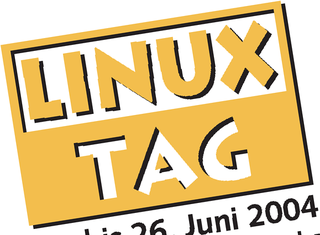
By Andreas Bohle, Jörg Luther and Mathias Huber
Linuxtag [1] opened its doors to the public on June 22 in Karlsruhe, south Germany, accompanied by a spell of hot summer weather. Europe's biggest Linux and Free Software event entered its eleventh year, but with a change. For the first time ever, Linux fans were asked to pay an admission fee.
It was understood that a change of this magnitude would affect the visitor statistics: Linuxtag 2005 notched up a mere 12,000 visitors compared with 16,000 last year. Andreas Gebhard, the press spokesperson for the organizers, Linuxtag e.V., was still satisfied, saying that the event was more action-packed than ever, with 180 talks in the four days. In addition, the organizers had put an extra 400 square meters of floorspace at the disposal of free software projects.
A number of projects used Linuxtag as a meeting point. For example, the Fedora project held the second FUDCON (Fedora User and Developer Conference) [2] in Karlsruhe, where they introduced the Fedora Directory Server. Scott Wheeler and Matthias Kretz from KDE defended their departure from the legacy Arts daemon in their keynote, using Linuxtag to promote a new KDE Multimedia Framework.
Ubuntu Linux, the current shooting star among Linux distros, was a big topic at Linuxtag. Benjamin Mako Hill explained the relationship between Debian and Ubuntu, which is a good thing, as it has never been simple. Mako himself is both a Debian project member and a member of the staff at Canonical Ltd., for whom he works on Ubuntu. "Debian is not a distribution anymore," he said, "Debian is a point in an ecosystem of distributions." According to Hill, developing Debian-based Linux distributions such as Ubuntu is completely legitimate. These distributions are not forks, but are, instead, projects that use the technology of the Debian "super-project" to satisfy user requirements.
Another Debian derivative has always been at home at Linuxtag: Knoppix, the live distribution by Klaus Knopper. Knoppix Version 4.0 was unveiled right in time for the show.
IBM caused a stir with a prototype of a computer that uses the new Cell CPU. Linux distributor Linspire drew attention with a self-confident battle cry "Our biggest competitor is Microsoft." Linspire CEO Kevin Carmony underlined the Linux distributor's current strategy. Whereas Linspire had previously viewed other Linux market segments as areas of competition, today the company, which employs a staff of about 100 world-wide, is more interested in cooperation.
Politics is often just as much a part of Linuxtag as technology. At the business and public authority congress, Secretary of State Ute Vogt, from the German Ministry of the Interior, talked about the use of free software in public administration. According to Ms. Vogt, now that numerous projects at national level are based on Linux servers, the next challenge is to closely investigate the use of Linux on the desktop. The Secretary of State closed by issuing a clear warning about the effect the planned EU patent directive could have on Open Source software. Luckily, Ms. Vogt can relax: the EU Parliament voted on July 6 to reject the patent directive.
| INFO |
|
[1] Official Linuxtag website: http://www.linuxtag.org/typo3site/8.0.html?L=1
[2] FUDCON: http://fedoraproject.org/fudcon/ [3] FreeNX: http://freenx.berlios.de |